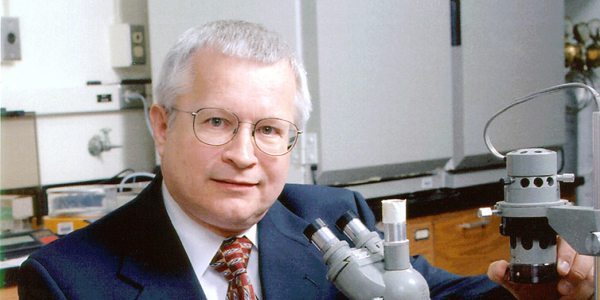|
Physician-scientists at HonorHealth Research Institute and the Translational Genomics Research Institute (TGen), an affiliate of City of Hope, played key roles in a study published today in the premier scientific journal Nature, which revealed previously unknown impacts of a protein in pancreatic cancer, the nation’s third leading cause of cancer related death. A dense tissue, called stroma, surrounds and often ‘hides’ the pancreatic tumor cells from the patient’s immune system and also prevents anti-cancer therapeutics from penetrating to the tumor. This results in “tenacious resistance” to the patient’s immune system and to therapeutic drugs, the study said. Following a systematic investigation of the proteins that result from the interaction of fibrous (stellate) cells, which surround pancreatic cancer cells, researchers zeroed in on the role played by a protein called Leukemia Inhibitory Factor (LIF), linking it to both the growth of pancreatic tumors and to the dense tissue that surrounds these tumors. In laboratory experiments, researchers found that both LIF blocking with an antibody and LIF genetic deletion “significantly slow tumor progression” and increase the effectiveness of chemotherapy to promote survival, according to the study, which included an international consortium of 18 researcher institutes, including TGen and HonorHealth Research Institute. “Pancreatic cancer is a very tough problem, in part because of the dense tissue surrounding the tumor,” said Dr. Daniel Von Hoff, TGen Distinguished Professor and Physician-In-Chief. “By uncovering the previously underappreciated role of LIF in the development of stroma, cellular interactions and tumor growth, our team has contributed significantly to the search for new therapies for this terrible disease,” said Dr. Von Hoff, who also holds the positions of Virginia G. Piper Distinguished Chair for Innovative Cancer Research and Chief Scientific Officer at HonorHealth Research Institute. In addition, the study says, the presence of LIF could be used not only as a therapeutic target, but also as a biomarker in circulating blood, which could aid in earlier diagnosis of pancreatic cancer and possibly in monitoring the effects of treatment. Like other digestive cancers, pancreatic cancer exhibits few symptoms in its early stages, and is usually not diagnosed until its late stages, when there are fewer options for treatment and chances of patient survival dim. Dr. Von Hoff played a substantial role in the study — Targeting LIF-mediated paracrine interaction for pancreatic cancer therapy and monitoring — by being the principal investigator on the study’s Stand Up To Cancer grant, and helping put together the investigation team. He also coordinated samples of pancreatic cancer tissue, and provided clinically relevant suggestions. “The discovery of LIF’s role in pancreatic cancer is tremendous as it gives us another avenue to treat pancreatic cancer. Furthermore, its potential role as biomarker is important as some individuals with pancreatic cancer don’t have a reliable biomarker and uncovering additional ways to monitor the disease is important,” said Dr. Erkut Borazanci, a TGen adjunct faculty member and Clinical Investigator and Medical Oncologist at HonorHealth Research Institute, who also provided tissue samples. Dr. Borazanci also is Medical Director of HonorHealth Research Institute’s Early Detection Pancreas Program. Funding for this study was provided by numerous government institutes and foundations, including: National Institutes of Health, National Cancer Institute, Lustgarten Foundation, Helmsley Charitable Trust, American Cancer Society, Howard Hughes Medical Institute, Ministry of Science and Technology of China, and National Natural Science Foundation of China. The investigation was led by the Salk Institute for Biological Studies, which provided facilities and staff. More specifically, Dr. Von Hoff’s work was supported by a grant from a Stand Up To Cancer (SU2C) Pancreatic Cancer Dream Team, and Dr. Borazanci’s contributions were supported by a grant from the Flinn Foundation. |




